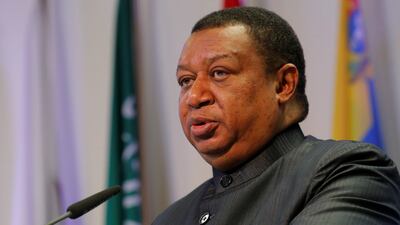Some energy trends are set by factors that grind forward as slowly, invisibly and inexorably as a drill-bit. Only a major global conflict, climate shift or technological or social upheaval looks capable of deflecting them. Last week’s World Oil Outlook from Opec, one of the industry’s most influential reports, offers reasonable optimism for the big oil producers in the coming years, but cannot dispel the long-term concerns.
At the most basic level, global energy use continues to be dictated by a combination of geology, demographics, macroeconomics and logistics, all of which are immutable except on longer time-scales. Opec’s report noted that Asian markets will continue to grow in their energy use for the foreseeable future, with a growing proportion of oil produced being used for transport and petrochemicals. Fossil fuels' share of the overall energy mix will continue to be large, but will begin to shrink, with the Middle East’s dominant role in petroleum production being sustained.
Within this context, it is possible to see a tolerable future for major oil exporters, in particular the Opec states. The future of Opec earnings is determined by three factors: the change in world oil demand, how much of this is supplied by the Opec states, and the price. Opec’s report a slow rise in all three.
_________________
Read more:
Kuwait's government upheaval puts energy reforms in jeopardy
Nuclear powered future is a key to environmental safety
Seizure of Kirkuk fields sees dreams of Kurdish autonomy crumble
_________________
What is striking is that this is about as good as it gets for Opec, particularly in the longer term. Short-term disruptions or a surge in demand, leading to a spike in prices, are always possible. But it is getting harder to foresee the rapid rise in prices and demand witnessed in the early 2000s. A scenario of faster economic growth over the whole period results in oil demand that even by 2040 is just 2.7 million bpd higher than the report’s mid-case.
Conversely, the Opec’s study sees alternative-fuelled vehicles – mostly electric – shaving just 4.9 million barrels per day off total road transport demand of 45.9 million barrels per day by 2040. It is not difficult to imagine – as environmentalists and even many mainstream forecasters do – that electric cars could take off much faster than Opec is forecasting.
The outlook for Opec’s market share is less rosy than for overall oil demand. The group’s total output, set to pick up a little to 2020, then stays essentially flat to 2023-2026, depending on the strength of non-Opec producers. In the most pessimistic case, when non-Opec output grows strongly, Opec would not get back to its 2017 production level until 2032 – a lost decade and a half. Compared to last year’s report, this year’s survey dramatically boosts forecasted US shale oil output up to 2022, by another 2.5 million bpd.
This eventual rise in the “call on Opec” is driven by the report’s assumption that US unconventional oil production will go into decline from 2025 onwards. Output from Russia barely grows to 2022 and then shrinks again, with only Canada, Brazil and Kazakhstan leading long-term gains. This relies on no other region emulating the American oil revolution over the next two decades.
The third component, oil price, has since the Second World War averaged $41.58 per barrel in today’s money; in the era of producer power, from 1973 onwards, it has averaged $57.67. The target price suggested by Opec’s current quota arrangement, currently around $60, might seem modest, but is actually above historic levels.
Opec’s report is itself coy on oil prices, perhaps wisely in view of other forecasters’ repeated egregious misses in both directions. Directionally though, it foresees a long-term price rise, itself a bold call in view of technology improvements and stagnating demand.
It is hard to see what could go much more right for Opec; demand or prices could certainly be somewhat higher, but not by a lot over the long term. It is far easier however to see what could go wrong: most obviously, the rise of non-oil technologies such as electric vehicles, spurred either by strong climate policies or simple technical and economic advances and consumer preference.
For understandable political reasons within the organisation, the report does not go into the division of Opec’s share between its members, or how their strategies might diverge. If the organisation’s crude output is flat around 34 million barrels per day, that gives little room for members who wish to expand: notably Iraq and Iran, and also the UAE and Kuwait. Iraq is the only country, inside or outside Opec, with the large, low-cost resources and the plan to match the Saudis in magnitude of flexible output. The Iraqis do not have the investment climate to achieve that eminence, or the strategy to use it – for now.
The tensions would be more acute if prices are not rising, making production growth the only route to expanded revenues. Members who seem doomed to falling long-term oil output due to limited reserves, notably Algeria and Qatar, will lose influence in Opec, although Doha’s gas will cushion its crude decline. Then wildcards such as Venezuela and Libya may see anything from collapse to strong growth, depending on internal politics and security.
In such a world, will the Saudi-led inclination towards moderate prices endure? And how will the Kingdom react if others within the organisation seek to gain market share and revenues while its own remain flat? The leading oil states should plan ahead for the unsettling implications of their latest research.
Robin M. Mills is CEO of Qamar Energy, and author of The Myth of the Oil Crisis


